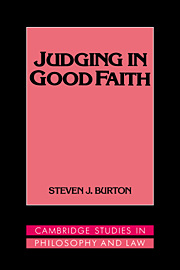6 - Philosophies of law
Published online by Cambridge University Press: 08 January 2010
Summary
DETERMINACY AND THE NATURE OF LAW
A further group of possible objections to the good faith thesis looks to certain philosophical understandings of the nature of law. Four otherwise very different philosophies claim that, among its central features, the law necessarily determines results. If this were so, judges could fulfill their duty to uphold the law only by reaching the results determined by the law. The determinacy condition would be a part of what judicial duty requires conceptually, and the idea of law-governed discretion would be a confusion. As we shall see, however, none of these four philosophies supplies adequate grounds for an account of the law that would render the good faith thesis pointless. Judicial duty should be understood shorn of the determinacy condition. Judges can fulfill their duty to uphold the law by exercising discretion in good faith. There is nothing essential about the law that renders discretion impermissible.
RULES, BY DEFINITION
Some readers might think that the law by definition consists only of rules and that rules by definition dictate results. The good faith thesis clearly would have no point were these a sound pair of propositions. They constitute, however, an assertion of determinate-formalism by fiat and do not need yet another refutation. In contemporary discussions in American legal theory, the model of rules serves mainly as a foil against which other theories of law can be contrasted and, more insidiously, as an implicit standard defining what a successful theory of law would have to establish.
- Type
- Chapter
- Information
- Judging in Good Faith , pp. 166 - 200Publisher: Cambridge University PressPrint publication year: 1992



